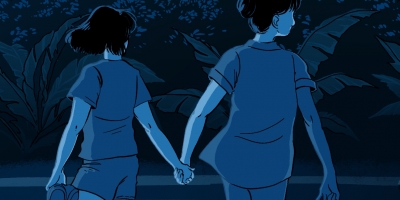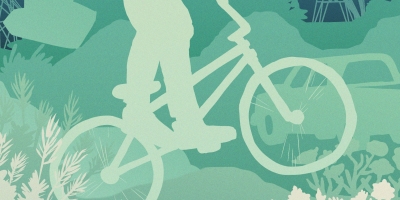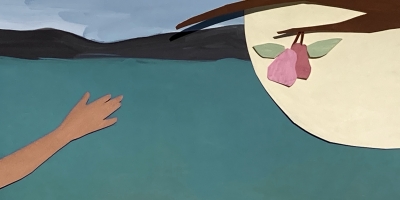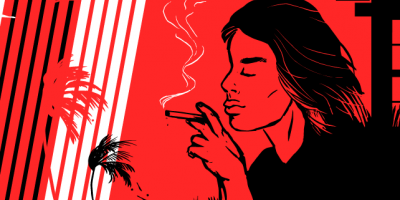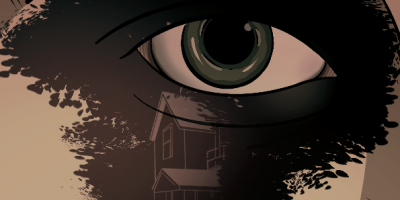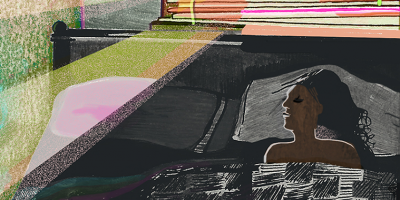Fiction
Come What May
by Danielle Decatur

Justin left me in the middle of the night, while I dreamt of my impending death. I woke up to orange light peeking through the blinds and the other side of the bed sunken with his imprint. In my dream I died slowly, which must be why I didn’t hear him start his noisy black Jeep, or open the kitchen drawer for a pen to write a note that said not nearly enough. Leave it to me to have death at a young age be the expected event in my life and my husband leaving the unexpected.
At first, I figured he had an early Saturday appointment to fix someone’s sink or toilet, until I found the note. It was stuck to the front of the coffeepot. I bet he debated where to leave it. He probably decided against the mirror in case I waited to brush my teeth, which I had. And I’m guessing the note was his last errand before leaving, which meant he couldn’t come back to the bedroom. If I happened to wake up while he was leaving it, he’d have to tell me to my face. I never figured Justin for a coward, but the coffeepot was a cop-out. Then again, our lives had been simple enough never to ask for more nerve than necessary. Maybe he had been like this all along, which in the beautiful orange daylight did not matter. According to Justin, this was about me. I had hoped over the years I’d become easier to love and harder to leave. I scooped a little more sugar in my cup and read over and over that he could not be there while I waited to die.
After six years of marriage he should’ve known that I was not waiting to die. I warned him when we met that women like me don’t live long lives. By women like me, I mean, quite literally, the women in my family. We do not live past the age of thirty-seven. I told him the very first day he stood in this kitchen. He did not believe me. He asked about cancer, genetic conditions, and other natural inquiries that come up when I tell people about the curse. All the women in my family died quiet deaths in their sleep. As if their early demise was enough of a shock and didn’t need to be overshadowed by the way it happened. “For me,” I said to Justin, “the gift is not life, it’s knowing that you’ll die. People live as if life goes on in perpetuity. Not me.”
Perhaps he married me because he expected a life of adventures and risks. Instead, I lived my days with only the things I enjoyed. As a pharmaceutical advertising copywriter, I learned it’s always the little things that people miss when they get sick. They wish they had appreciated the walk to the mailbox or the dexterity it takes to open a jar. So I decided I would live within my means, to rack up those treasures instead of memories overseas. When he asked me to marry him, he said, “Apparently one day I’ll wake up without you, but waking up next to you each morning is worth the chance.” I poured a second cup and read the note again; I guess that had been a lie.
“Are you sure you want to do this?” Nic asked me and folded another shirt.
“Yes. I don’t want any more surprises,” I said while rummaging through Justin’s top drawer. “It says to bring her something he wears often, something he cherishes, and something I can’t live without.”
Nic sighed and went to my closet to help gather the things we needed for The Lady of Tomorrow. “Maybe he’ll be back,” she said. “It’s only been a few days.”
I shook my head.
I wished we’d had a fight or something, because that would be easier than accepting that my husband disappeared in the middle of the night. For three days, I waited. First I called in sick for work. Then I watched the seconds turn to minutes turn to hours. I had never done this—and that was the gift I told Justin about when we first met. I never wasted time. I went to work and was surprised when it was five o’clock. I figured out exactly how many hours I needed to sleep and jumped out of bed. I did not re-read books, even when the stories begged me to stay in their worlds forever. Knowing I would die was my luxury, not time. But for three days I watched the clock and wondered if this was what people felt like on vacation. The only thing that snapped me out of it was the phone call I got from Nic.
“You don’t want to call any of his friends? Or his mom?”
“He has to come back for this stuff. And if he does, I want to know what I should do. That’s what I’m going to ask Lady T.”
I wanted to know if my marriage was over; and if Lady T had time, I wanted to know when I would die. Of course, I had thought about this before, but when Justin left, it seemed like my life was, ironically, beginning to end. It was as if death had started its preparations, erasing my collection of reasons to be. No husband, no reason to love. It seemed that, eventually, the preparation would leave me empty enough, and when death came to me like a gentle visitor, I would feel relief.
“Do you think he packed a bag?” I said to Nic while looking for his favorite shirt.
“Oh, Chloe,” she said, gently taking the shirt from me. “I don’t know, sweetie.”
“People know when their husbands are planning on leaving them, right?”
Nic closed the closet, grabbed my hands, and said, “Listen, we all thought you two were going through something. What was up with that mess he said on your birthday?”
Thinking about his toast—To your last two years on Earth—made me wince. Maybe he never believed in it.
“Here it is,” I said, holding up a red shirt with a bulldog on the front.
“Is this something he wears often or something he cherishes?”
“He wears this often.”
The day we met, he wore this shirt underneath his work uniform. I noticed the faded red peeking through his open blue collar when he stood in my doorway asking if I still had trouble with my kitchen sink. My friends teased me for years about meeting my husband like we were in a romantic comedy or really poorly scripted porn. I wish it were that exciting. My sink had filled up with sewage overnight. Justin was unbothered by it and promised me he’d seen worse. I called off work and dealt with the sewage smell for hours to talk to the cute plumber who was curious if I was single. This was the kind of risk I took with an expiration date looming. I said yes to someone because it felt good, even if we never made sense.
“After we find these, we should think about what you’re going to wear. I read somewhere that Lady T uses everything to gather insight as to who you are.”
“Well, obviously I’m not going to wear my pajamas. I’m scared to think what anyone who can read people has to say about my leopard shorts.”
“Have you decided what you’re going to ask her?”
Of course I had, and the way she asked me, so had Nic.
“Mostly about Justin,” I said. “Where is he? Is he coming back? What’s our future together look like?”
I didn’t want Nic to know that I also planned on asking about my death. She’s been my best friend since wood-chip playgrounds and believes in the curse as much as I do, but she thinks it’ll be a self-fulfilling prophecy if I know too much.
I discovered Lady T after seeing her on a local Cleveland news segment. Justin hated the evening news because of stories like this. He would fix himself a beer and head down to the basement to play video games when it was time for the local segment. I, on the other hand, loved seeing this kind of story. Lady T was amazing. She wore a brightly colored smock and big peacock feathers as earrings. Unlike other fortune-tellers, she wasn’t afraid to give bad news. Once, she correctly predicted a horrific car crash downtown, including the exact number of cars that were in the pileup.
Nic held up the watch I gave Justin on his thirty-fifth birthday.
“I don’t know if I would say he cherished that,” I said and pointed to the untouched sizing holes in the leather. “He’s never even worn it. See?” I handed her back the watch. I’d picked this one because the gears and hatches were visible right there; a thin layer of glass protected everything. The cognac leather straps would’ve wrapped a reminder to Justin’s wrist that time was nothing more than a machine—it too would eventually stop.
“Well, his loss. It’s a beautiful timepiece.”
“I should just take the controller to his game system.”
“That’s not a bad idea. It’ll have his scent on it,” Nic said, and closed his nightstand.
“Lady T is not a dog,” I said as Nic walked toward the den to grab the controller.
“I know, but it can’t hurt,” she said over her shoulder.
At a romantic point in our marriage, I would’ve said I could not live without Justin. But I woke up after he left me, which was evidence to the contrary. I grabbed my mother’s cookbook and placed it with the shirt and the controller in my reusable shopping bag. It was part cookbook and part history of our family. The recipe for mac and cheese included in the margin the reason why the women in our family should never, ever travel abroad. It seemed we were determined to live small, maybe simply enjoy life. I decided to live life with care, on purpose, so death could become like the due date on a library book. Good story, but it’s time to return it. The women before me all died with enough impression on the people in their lives that they were mourned, but not grieved. That was the risk of a small life: the potential to be forgotten.
On the page with pineapple upside-down cake, my mother tried to calculate the age she would die based off statistics and risk factors. She subtracted years for smoking, drinking, driving fast, and being Black. She stopped in the middle of the equation. Unless she aged in dog years, five was not the age she died. I did the same calculation when I decided to go to a public Ivy in the South. After growing up in Cleveland, I liked the idea of sandals well into September. Plus, I figured if being Black hadn’t killed me yet, what would a few years below the Mason-Dixon do to me?
I arrived early for my appointment with The Lady of Tomorrow. The neon sign sat above a floor-to-ceiling window with a small bistro table, two chairs, and a note that read: I knew you would be early, please come back at your scheduled time. I guess in a business where things happen exactly as they’re supposed to, timing is everything. I checked my watch. I had some time to kill before my appointment.
It was cold, but it was Cleveland and Lady T’s shop was by the water. I shoved my hands into the pockets of my camel coat and tried to remember if there was a coffee shop or restaurant nearby without looking at my phone. After growing up in Shaker Heights, the downtown area still seemed foreign. I never visited the Flats. Justin and I were married in a small church across from a Rapid station. We danced barefoot in my grandfather’s backyard to old jazz. Nic told me it was the most carefree wedding she’d ever attended.
I lit a clove when I reached the end of the alley. I truly enjoyed smoking. People who are perpetually quitting succumb to the idea they’re addicted, but for me it was a nice indulgence. I wasn’t concerned something horrible like lung cancer would kill me, so I lit up whenever I felt like it. Justin never bothered to tell me to quit smoking. He liked that cloves made me smell like cinnamon. He said I always smelled warm, like generosity.
I was too busy thinking about Justin and almost missed this woman asking if I had another.
“It’s not a regular cigarette,” I said.
“I know, that’s why I want it.”
She was a petite older woman whose voice seemed too deep for her face. I handed her the thinly wrapped tobacco and lit it for her as she placed it between her dry lips.
“Girl, don’t waste your money on that lady.”
“I’m not,” I said and shoved my hands into my pockets. My new smoking buddy sat back on the ground and tugged at the hem.
“You must be one of those girls from the burbs.”
“That obvious?” We laughed and took a drag. Although I hated when people understood me too quickly—I never seemed mysterious. I wore my hair in the same hairstyle for twenty years. Even after I stopped relaxing it, I kept it straight, sitting neat under my chin. I painted my nails a dull pink during the warm months and dark gray for the colder ones. My skin was a smooth brown and blemish-free. Nothing about me was extraordinary. Maybe that’s what Justin hated too.
“How about I buy you a coffee,” I said.
“You think I need charity from you?”
“No. It’s nothing like that. You’d be doing me a favor. I’m meeting my friends at the casino and I’m early.”
I couldn’t tell if she bought my lie, but her knees popped as she stood. She folded up a small, light-blue knit blanket that seemed recently washed clean of residue from the corner of St. Clair.
“All right,” she said.
Dorothy Lewis was her name, and she lived in Silver Lakes, a popular assisted living center. She corrected my unsaid assumptions for most of the way to the coffee shop. She did not live on the streets. Her assisted living center was nearby, but they let her out on Saturdays.
“Well,” Dorothy said. “They don’t let me out exactly. I have a friend who signs me out on the weekends. Everyone thinks she’s my granddaughter. Most white folks think we’re all related anyway. She’s a good kid.” According to Dorothy, as long as she returned in time to take her Sunday medicine, no one was the wiser.
“Before you even think about asking me why I prefer the streets to some two-room apartment, I’ll tell you this—it’s never lonely on the street.”
“I get it—you met me!”
“Figures you’d think the world revolves around you.”
The heat from the restaurant greeted us like the warm cup of soup advertised on the window. The hostess sat us in a booth near the back of the restaurant. The smooth vinyl seats felt cold through my jeans.
“I’ll have a coffee and the western omelet. Oh, and add spinach. Tell Darla I don’t want none of that canned stuff, use it fresh from the salad bar.” Dorothy handed over her menu and said to me, “I could use the extra iron.”
“What’s the soup?” I asked.
“Friday, it’s clam chowder,” the waitress said.
“I’ll have that and a coffee.”
“Girl, you better eat. I haven’t seen anything as skinny since Lil’ Lil. So tiny you had to say it twice.”
“Was she a friend of yours?”
“Lil was the best kind of friend there could be. She lived next door when I was at Silver Lakes, snuck me sour cream when it was baked potato night. I wasn’t supposed to have any with my high cholesterol numbers, but Lilly didn’t care. And neither did I! Shoot. I’m still here. Stayed alive so long I ran out of money.”
“Sour cream isn’t good for you.”
“Neither is listening to a fortune-teller.”
At some point on our walk, I thought Dorothy might be Lady T. But would she try so hard to make me not believe in her? The waitress returned with our coffees.
“I told you I wasn’t going to her.”
“Girl, I sit outside that fortune-teller’s window all the time. I know you weren’t really looking for the casino.”
I stirred my coffee, embarrassed to meet Dorothy’s eyes. “I’ve never heard of Silver Lakes. Is that in Lakewood?”
“You don’t care about Silver Lakes, and neither do I. So why are you going to see Lady T? Mostly it’s the skinny white girls that stop by. They look so pitiful with tears in their eyes, wondering whether they should go to this college or that one. But I don’t see many Black people spending their money on a reading.”
“I want to know if my marriage is over.”
Dorothy shook her head. “What did he do?”
“It’s not what you think,” I said. “He didn’t cheat or anything.”
“Okay, so what did you do?”
“I’m not the kind of woman who wants more out of life. I like things easy. I like things to taste good, feel good, no fuss. But that makes me like one of those paper doll women. No body, no curve, nothing to hold onto.”
Dorothy gave me a look, and I pretended there was more coffee in my cup so I had an excuse to look down.
“Nah, that can’t be it,” Dorothy said. “You must be having the postman’s baby.”
We laughed, and after days of sitting and waiting, I needed funny, outlandish.
The food arrived. Dorothy used her saucer to give me half of her omelet.
“I don’t think it was your fault,” she said lifting the eggs. “I think he left for the same reason most men leave—they don’t want to be the ones left behind.”
“But I would never leave him.” Then I thought about the curse. Dorothy returned to her omelet, as if her words hadn’t stopped me cold. Maybe our marriage hadn’t been so bad. We still made love regularly. I trimmed his nose hairs when he needed it. He kissed me in the middle of the night, if I fell asleep before he returned home. Justin made life feel big. He celebrated the big and small, like promotions or getting everything right on the shopping list. I complained about him making a fuss, but maybe that was his way of collecting memories with me. Maybe he’d collected enough. Perhaps he’d had his fill of me and decided to get out before the memories he collected started to seem like not enough. I was lost in my thoughts and looked up to see Dorothy staring at me, chewing slowly.
“You know,” she said, pointing her fork toward me, “I get the feeling you don’t believe that.”
“Can I get you all anything else?” the waitress asked with the check in her hand.
We shook our heads. I opened my purse for a twenty-dollar bill.
Outside, we lit another clove. I couldn’t stop thinking about the idea that Justin had given up before our time was really over.
“Coward.” I apologized to Dorothy. I hadn’t realized I said that out loud.
“People give up. It’s a part of our nature as much as hair and reasoning.”
I never asked how old Dorothy was, but the amount of wisdom in this bite-sized woman made me believe she lived at least twice as long as I ever would. We reached the alley and finished our cloves. I handed her the blue blanket, although I would’ve preferred to keep talking to her and listening to what she had to say. I did not tell Dorothy that I had missed my appointment.
“My dear,” she said. “Here’s where I leave you. I appreciated the company as much as I did the story.”
“Me too.”
“And listen, your husband may come home. People give up, but they also start over.”
“What if I don’t have enough time to start over?”
“You have enough time,” she said, and left me in the dark alley.
For a moment, I imagined she was right. I pictured myself living another thirty-five years. Justin would come home to me, flowers in hand. For the next three decades we would celebrate everything small and big. I would live as if I only needed him. We would have three children, all boys. But I would give them middle names from the women in my family. I would break the curse and die from all the cloves I smoked over the years.
I had never dreamed of dying like that before. I had never dreamed of death as something to wake you up. Perhaps that was why I kept sleeping, and why I never heard the car, or the drawers, or even the bed squeak. Perhaps all the women in my family died this way, in their sleep.
